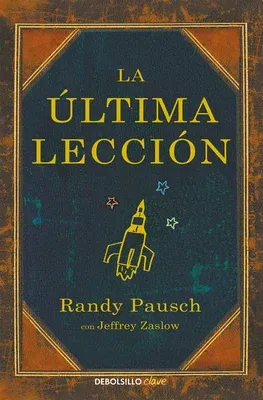¿Qué sabiduría impartirías al mundo si supieras que es tu última
oportunidad?
«No podemos cambiar las cartas que se nos reparten, pero sí cómo jugamos
nuestra mano.» --Randy Pausch
Muchos profesores pronuncian conferencias con el título «La última
lección». En ellas, los organizadores suelen pedirles que se planteen su
propia muerte y consideren qué es lo que más les importa en la vida.
Cuando se invitó a Randy Pausch --profesor de ciencias informáticas de
Carnegie Mellon-- a impartir esta conferencia, no tuvo que echar mano de
su imaginación, porque le acababan de diagnosticar un cáncer terminal.
Sin embargo, su conferencia titulada «Cómo alcanzar los sueños de tu
infancia» no trataba de la muerte, sino de la importancia de superar los
obstáculos, de hacer posibles los sueños de los demás, de aprovechar
cada momento. La conferencia fue la suma de todo aquello en lo que creía
Randy. Era una conferencia sobre la vida.
ENGLISH DESCRIPTION
After being diagnosed with terminal cancer, a professor shares the
lessons he's learned--about living in the present, building a legacy,
and taking full advantage of the time you have--in this life-changing
classic.
"We cannot change the cards we are dealt, just how we play the hand."
--Randy Pausch
A lot of professors give talks titled "The Last Lecture." Professors are
asked to consider their demise and to ruminate on what matters most to
them. And while they speak, audiences can't help but mull over the same
question: What wisdom would we impart to the world if we knew it was our
last chance? If we had to vanish tomorrow, what would we want as our
legacy?
When Randy Pausch, a computer science professor at Carnegie Mellon, was
asked to give such a lecture, he didn't have to imagine it as his last,
since he had recently been diagnosed with terminal cancer. But the
lecture he gave --"Really Achieving Your Childhood Dreams"-- wasn't
about dying. It was about the importance of overcoming obstacles, of
enabling the dreams of others, of seizing every moment (because "time is
all you have . . . and you may find one day that you have less than you
think"). It was a summation of everything Randy had come to believe. It
was about living.
In this book, Randy Pausch has combined the humor, inspiration and
intelligence that made his lecture such a phenomenon and given it an
indelible form. It is a book that will be shared for generations to
come.

